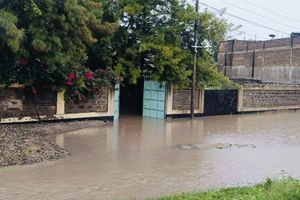Exam chiefs have eyes on six cheating ‘hot spots’
The national examiner has identified six regions it says have a likelihood of cheating in the Kenya Certificate of Secondary Education tests, which start Tuesday morning.
Knec chief executive Paul Wasanga told reporters in Nairobi that security officials had spotted some exam centres in Nairobi, Eastern, North Eastern, Rift Valley, Coast and Nyanza with “preparedness to commit irregularities”.
Mr Wasanga said officials will be more vigilant to make sure cheating does not occur.
“The government has assigned the council enough security personnel to monitor the Knec examination processes and officers involved in its administration,” he said.
Knec said some of these areas were noted as far back as July when a suspect was caught soliciting money, claiming he could provide exam papers.
“A teacher was arrested in July by anti-corruption police officers in Garissa after he asked a candidate for money so that he can be assisted with genuine examination materials. The teacher was charged in an anti-corruption court in Embu,” Mr Wasanga said.
The council could not reveal the exact centres, but said they were in Malindi, Lamu, Wajir, Marsabit, Moyale, Meru, Eldoret, Kisumu, Nakuru and Nairobi.
In Nakuru, Knec warned the public to beware of a man said to be peddling fake exam papers.
“Cheating is as old as history itself and the public should understand that it is the business of us all to eliminate it,” he said.
Cheating has been a major challenge in guaranteeing the credibility of national exams. Normally, Knec cancels the results of the cheats.
However, in the 2010 KCSE exam, the government announced that the vice had declined significantly from 1,711 cases in 2009 to 534.
This had followed a government directive to ban cheats from re-sitting the exam until after two years. The ban was later lifted after intense lobbying.
On Monday, the Anti-Corruption Steering Committee announced that it would start educating the public to equate cheating with corruption.
The committee’s chair, Archbishop Eliud Wabukala, told reporters: “We can never find a better assessment of learning than through examinations. But we have to find a credible way of conducting them without cheating.”
This year, 413,177 candidates who joined high school shortly after the post-election violence in 2008, will sit the exams.
They also become the second group of Form Four candidates to sit for a national examination under the new Constitution.
At the same time, 1,299 South Sudanese students will sit the same exam in Juba, up from 1,200 last year.
Mr Wasanga assured parents and candidates that heavy rains in Coast would not hamper the distribution of exam materials.
“There is no place that the exam will not reach. We have used choppers before, and we are ready to use them again.”
Without a hitch
Last week, the rains cut off parts of Kilifi, washing away bridges and sections of the road. The sea was also too rough to navigate.
Mr Wasanga said preparations had been made to ensure the exam goes on without a hitch. The council is working with the Provincial Administration to ensure the security of candidates, supervisors and the papers.
“We had a meeting with Provincial Police Officers and they have briefed their areas on what needs to be done,” Mr Wasanga said.
Of the 6,338 exam centres countrywide, police officers will be posted to those prone to bandit attacks. These are in North Eastern, Coast, Samburu, Pokot and Turkana.
In case of emergency, officials are to call 0706335717, 0706335718 or 0789188994 for help.
Students will sit for the English (Functional Skills) exam at 8.30 this morning before sitting another English (Comprehension, Literary Appreciation & Grammar) paper from 11.15am to 1.45pm.
The council on Monday rushed to correct errors that had been discovered when students registered for exams online.
At the weekend, students in Bahati Secondary School in Nairobi’s Kayole had complained that their names had been mixed up while others complained that they had been registered to sit the wrong subjects.




